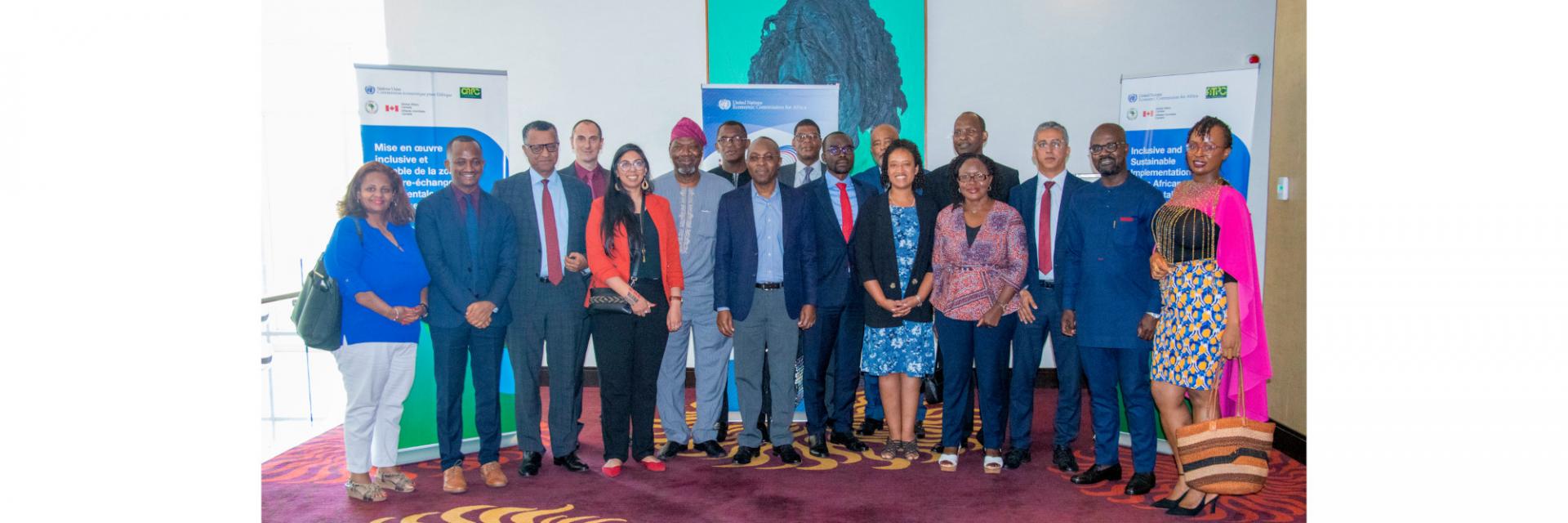Accra, Ghana, 4 May 2023 (ECA) - Stephen Karingi, Director of Regional Integration and Trade Division at the Economic Commission for Africa (ECA), called on African countries to expedite the reform of their domestic policy and institutional landscape to boost intra-African trade and accelerate economic transformation through effective implementation of the African Continental Free Trade Area (AfCFTA).
Addressing the opening of the third African Trade Policy Centre (ATPC) Steering Committee Meeting (SCM) in Accra, Ghana, Mr. Karingi said while celebrating the AfCFTA, Africa is now mulling its next steps towards a customs union and a common market. Thanks to the AfCFTA, Mr Karingi added, the continent was no longer a helpless bystander as developed countries pursued their own strategic interests at Africa’s expense.
“The AfCFTA now offers the perfect platform for Africa to pursue policies of strategic autonomy just like everyone else is doing,” Mr. Karingi told participants, underlining that the AfCFTA was a development tool that can help Africa tackle many challenges such as food insecurity, joblessness, marginalization and health insecurity.
“The AfCFTA can help Africa fix its macroeconomic challenges, address food insecurity, overcome the predicament of jobless growth, and serve as a tool for inclusive and sustainable development. All this is possible, but only if we fully implement the AfCFTA and unleash its potential to the full,” said Mr. Karingi.
The key to succeed in this endeavour lies in our ability to use the AfCFTA as a platform for Africa’s industrialisation, added Mr Karingi. To this end, ECA is supporting several initiatives, including the development of the electric battery value chain in the Democratic Republic of Congo and Zambia.
Speaking at the same meeting, ATPC Coordinator Melaku Desta welcomed the members of the Committee, thanked the Government of Canada for its long-standing support to the ATPC for nearly 20 years now, and expressed his appreciation to the AfCFTA Secretariat, the AU Commission, the regional economic communities (RECs), representatives of the organized African private sector and civil society, and other members of the Committee for their commitment and guidance to the work of the ATPC. Mr Desta described the Steering Committee as ATPC’s principal governance mechanism that provides oversight and guidance for its overall direction and strategic priorities.
On her part, Ms. Marjorie Cheron, Co-Chairperson of the Steering Committee and representative of Global Affairs Canada, described the AfCFTA as “a game changer that promises to create a stable business environment with common rules that will lead to the establishment of a single market of significant size”.
Ms Chéron informed the Committee that Canada is working on an economic cooperation strategy with Africa which will set the vision for the future of economic partnership to establish a robust, long-lasting, and collaborative trade and investment framework for Africa’s inclusive economic growth.
Ms Chéron also announced that, in the next few weeks Canada will be hosting the African Union Commission to engage in the first Trade Policy Dialogue with Canada that will focus on trade policy topic and investment issues.
Also at the same meeting, Prudence Sebahizi, Director of Institutional Matters and Programmes Coordination at the AfCFTA Secretariat, who represented H.E. Wamkele Mene, Secretary-General of the AfCFTA Secretariat and Chairperson of the ATPC Steering Committee, applauded ATPC's role as an African thinktank on trade policy and related matters that provides an indigenous voice on some of the most pressing regional, continental and global trade policy issues that determine Africa’s future in the world.
Mr. Sebahizi added that ATPC can assist the continent in the need to interrogate the different reports that are released by a host of institutions globally, develop a harmonised methodology to assess the likely impact of the AfCFTA on intra-African trade, continental GDP, the welfare of citizens, industrialisation, similar parameters.
Mr. Sebahizi outlined a list of issues that should still guide all the work that the ATPC does, including a continuing search for an explanation as to why Africa, despite its endowment with abundant natural and human resources, remains far behind all other parts of the world, what the AfCFTA can contribute to change this reality, and what can be done to maximize the positive impact of the AfCFTA and expedite Africa’s transformation.
At its conclusion, the Steering Committee applauded the relevance, quality and volume of work being done by the ATPC, approved its narrative and financial report for 2022 as well as the work plan and budget for 2023, and commended ECA for the role it continues to play in championing Africa’s social and economic development.
Issued by:
Communications Section
Economic Commission for Africa
PO Box 3001
Addis Ababa, Ethiopia
Tel: +251 11 551 5826
E-mail: eca-info@un.org

